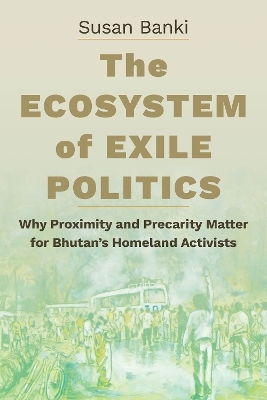
The Ecosystem of Exile Politics
Why Proximity and Precarity Matter for Bhutan's Homeland Activists
Seiten
2024
Cornell University Press (Verlag)
978-1-5017-7819-3 (ISBN)
Cornell University Press (Verlag)
978-1-5017-7819-3 (ISBN)
- Lieferbar (Termin unbekannt)
- Versandkostenfrei
- Auch auf Rechnung
- Artikel merken
The Ecosystem of Exile Politics relays the events in Bhutan that led to the exodus of one-sixth of the population, and then recounts the activism by Bhutan's refugee diaspora that followed in response. Susan Banki asserts that activism functions like a physical ecosystem, in which hubs of activism in different locations interact to pressure the home country.
For Bhutan's refugee mobilizers, physical proximity offers advantages in Nepal and India, where organizing protests, lobbying, and collecting information about government abuse in Bhutan is aided by being close to the homeland. But in an ecosystem of exile politics, proximity is both a boon and a bane. Sites proximate to Bhutan can be spaces of risk and disempowerment, and refugee activists rarely secure legal, political, and social protection. While distant diasporas in the Global North may not be in precarious situations, they cannot tap into the advantages of proximity. In examining these phenomena, The Ecosystem of Exile Politics adds to theoretical understandings of exile politics and to empirical research on Bhutan and its refugee population.
For Bhutan's refugee mobilizers, physical proximity offers advantages in Nepal and India, where organizing protests, lobbying, and collecting information about government abuse in Bhutan is aided by being close to the homeland. But in an ecosystem of exile politics, proximity is both a boon and a bane. Sites proximate to Bhutan can be spaces of risk and disempowerment, and refugee activists rarely secure legal, political, and social protection. While distant diasporas in the Global North may not be in precarious situations, they cannot tap into the advantages of proximity. In examining these phenomena, The Ecosystem of Exile Politics adds to theoretical understandings of exile politics and to empirical research on Bhutan and its refugee population.
Susan Banki is an Associate Professor at the University of Sydney. She focuses on human rights/social justice issues in the Asia-Pacific region.
| Erscheinungsdatum | 02.10.2024 |
|---|---|
| Zusatzinfo | 5 Maps |
| Verlagsort | Ithaca |
| Sprache | englisch |
| Maße | 152 x 229 mm |
| Gewicht | 454 g |
| Themenwelt | Sozialwissenschaften ► Politik / Verwaltung ► Europäische / Internationale Politik |
| Sozialwissenschaften ► Soziologie | |
| ISBN-10 | 1-5017-7819-6 / 1501778196 |
| ISBN-13 | 978-1-5017-7819-3 / 9781501778193 |
| Zustand | Neuware |
| Haben Sie eine Frage zum Produkt? |
Mehr entdecken
aus dem Bereich
aus dem Bereich
Studienbuch
Buch | Hardcover (2023)
De Gruyter Oldenbourg (Verlag)
CHF 62,90
erfolgreiche Interessenvertretung durch Prozesskompetenz im komplexen …
Buch | Hardcover (2023)
Wiley-VCH (Verlag)
CHF 58,75


